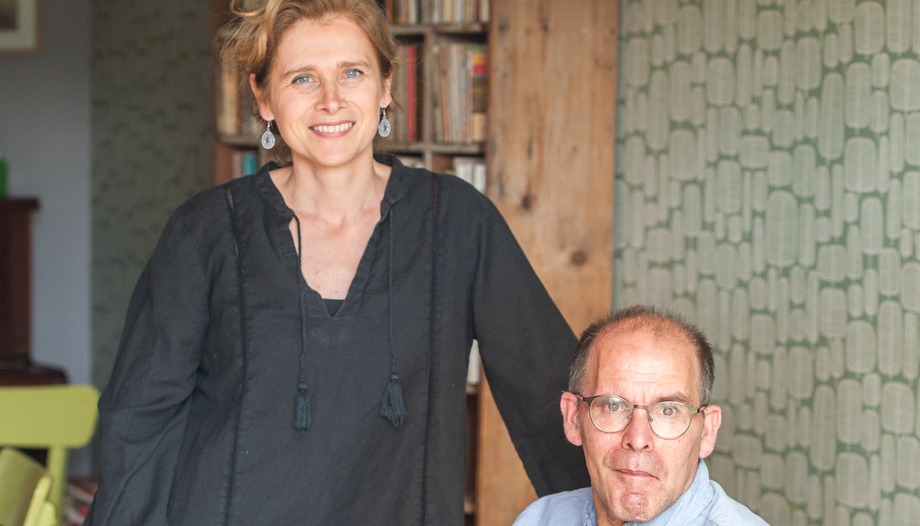Cédric and Sophie Barut formed a couple young who, after eight months of marriage, received a blow that knocked the wind out of them. He had said goodbye to his wife just a few hours earlier to go for a ride on his bike, a regular thing that helped calm his nerves. However, the evening came and Cédric still hadn't returned home.
Worried, Sophie began a race in search of her husband. She drove the route he would have taken, went home, called him... Nothing. Until she contacted the police and the answers began to come. Soon after, she went to the hospital, where she finally found her husband.
A drunk driver had run over Cédric. While her husband was in a coma, with complications that the doctors pointed out to Sophie but that she could not understand, with fear as a companion, the young wife noticed that the world stopped.
That was the beginning of an odyssey that this married couple faced together. They developed a method to communicate when Cédric could not speak, they tried to fill the gaps left by his amnesia, and Sophie faced the questions and prejudices of those around her. Work life became complicated and they had to move to a house adapted for Cédric's wheelchair. And in the meantime, Sophie wrote down her daily life.
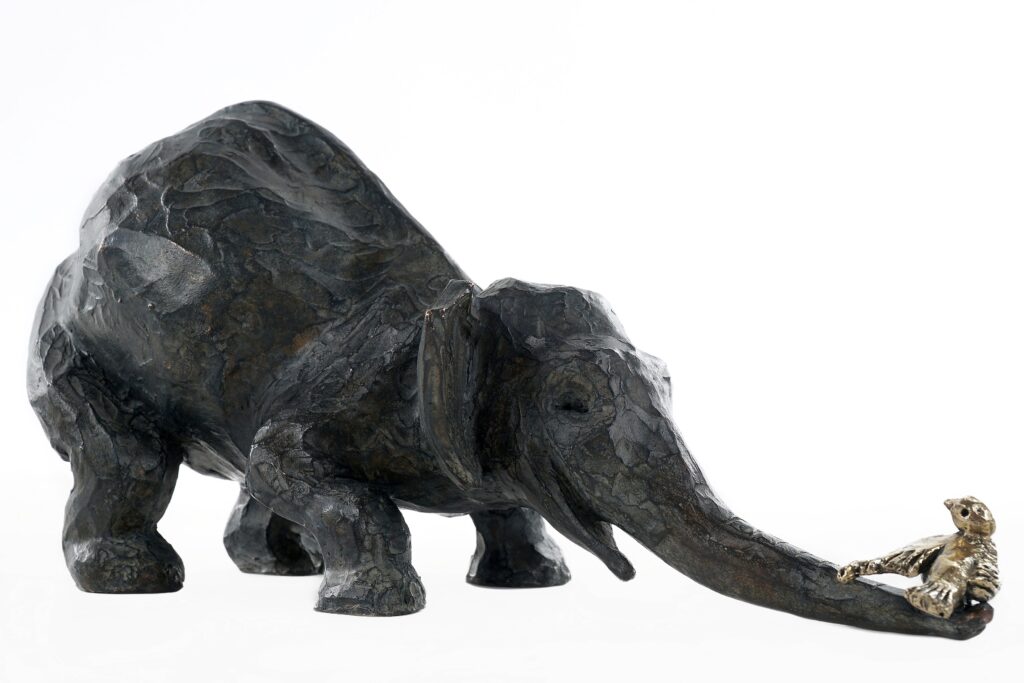

Years later, his testimony can be read in a book recently published in Spanish: "I'll be back before nightfall". In it, in addition to his story, you can find snippets of Cédric's poetry and mentions to the sculptures Sophie performs.
In this interview, the two protagonists talk about the role God played in strengthening their marriage and moving it forward, about the life they lead with their four children and the reasons why they decided to share their testimony.
Sophie, why did you decide to write this book? What did you think about this decision, Cédric?
- [Sophie]: At first I decided to write this book because a journalist came to ask us questions 10 years after the accident and I couldn't remember everything. I had to reopen a diary I kept since high school, which I continued at my wedding and then during the accident, until our first child arrived, 5 years later. By then I had stopped writing, trapped by life as a mother, but I kept those 7 notebooks in a locked drawer at home. I was convinced I would never read them to anyone.
As I reread the pages I told myself that we had come a long way, that this adventure was not just any adventure and that God had never failed to help us every time we gave up. I told myself that I had no right to keep all of God's exploits in our lives to myself.
It was the time of the Paris attacks and French journalists were saying that all religions were vectors of violence, and I could not allow them to say that. My Christian religion saved me, my husband and my family. It was Christ who helped me to love those around me better, to be courageous and to move forward. I could not keep quiet.
And then I would often meet wives of people with head injuries who were very unhappy, couples who had separated because of disability. I would say to myself, "If certain words resonated with me and allowed me to move on, why wouldn't they do the same for these women?" There is something universal about the discoveries I have made through this ordeal.
- [Cédric]: This book is the memory I don't have. It has brought to light the meaning of it all. It is a testimony that I hope will help others affected by the ordeal. We would have loved to have had such a book in our hands when everything was turned upside down and we realized the magnitude of the challenge. I am always happy to accompany Sophie when she gives talks at high schools, universities, parishes and associations.
Is it possible to maintain the habit of prayer and the presence of God in the midst of such an unusual life?
- [Sophie]: Our life is certainly unusual in the eyes of others, but it is ours, it is the only one we know, and we have our points of reference and our rhythm. It is a sometimes fragile balance, which has to be reinvented as each difficulty arises, but what is certain is that prayer occupies its rightful place in it. I would even go so far as to say that prayer has become indispensable. Without it, disability closes us in, creating frustrations that interfere with our relationship.
We try to have a moment of prayer as a couple every night to commend our children and our parents to God, to commend ourselves the next day and to give thanks for the day. Praise is a real engine of progress. Give thanks for all the good things of the day: there are always good things.
I try to go to Mass every morning and then there is the Angelus at noon, and all the little words I say to Jesus, Mary and the guardian angels during the day. Prayer has become our breath. Sometimes we put it aside because the daily rhythm distracts us from it, but the consequences are such that we take it up again quite quickly.
- [Cédric]: I would say that for me it is even easier to have a regular rhythm of prayer because I have a lot of quiet time, a lot of frustrations to offer, a lot of help to ask for.
I like to make spiritual retreats, often accompanied by a friend and sometimes by a nurse. I also enjoy moments of adoration before the Real Presence of Christ, in chapels in Lyon. The Rosary, which is a powerful weapon, also accompanies me.
What has enabled them to remain faithful to their marriage vows?
- [Sophie]: Ever since I was a little girl, my ideal was to start a family with a man I would choose for life. I always wanted my life to be a beautiful story, a wonderful adventure, and to have no regrets when it was all behind me. But I was very fragile, "hypersensitive" as my parents used to say, and I tended to dramatize every little difficulty I encountered. I was not "armed" for such an adventure.
Very soon I realized that if I wanted to live my dreams and be happy overcoming the challenges that life had in store for me, I had to ally myself with Jesus. Alone, I realized that I would never make it.
I could have gritted my teeth and stayed with Cédric out of duty, but I would not have been happy, I know. It was God who gave me love to give to Cedric. God helped me every day to breathe life into our home, to bring freedom, laughter and surprises. I am deeply convinced that without God my life would have been a profound disaster, because trials can harm you if they are lived without love.
- [Cédric]: It was my lifelong love for Sophie that helped me stay true to my marriage vows. Sophie was my only chance to return to a more or less normal life. I wouldn't have left her for anything in the world.
Based on your experience, what advice would you give to a married couple in a similar situation?
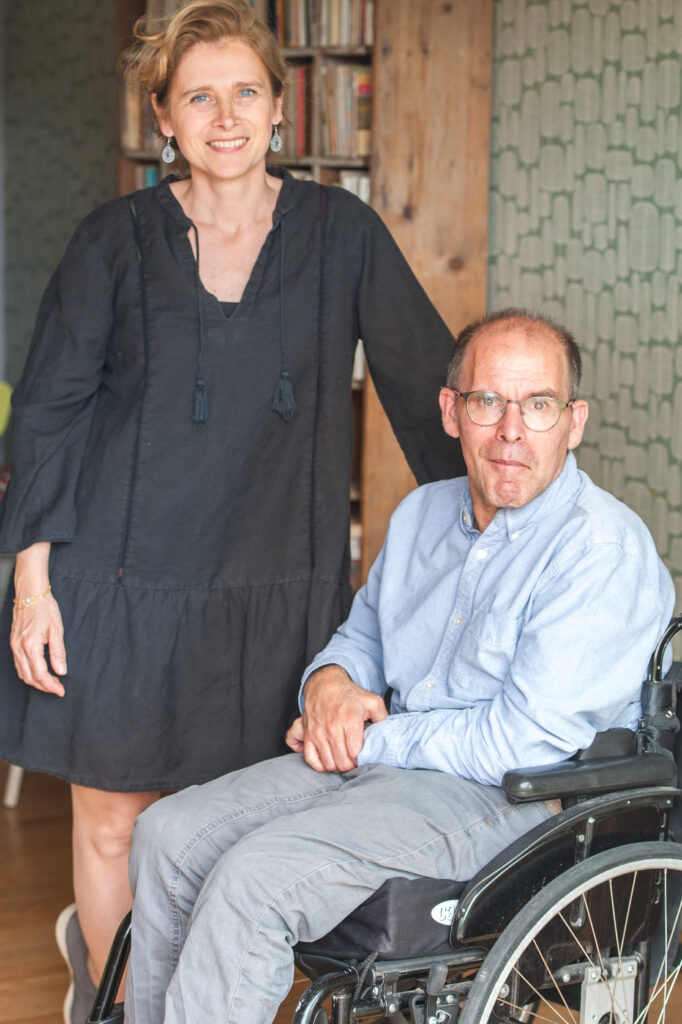

- [Sophie]: My advice to couples in this situation would be to first ask themselves: what is my purpose in life? What is the meaning of my life? What is a good life for me, a successful life? What "mark" do I want to leave at the beginning of my life? When I present myself to God at death, what will be in my "suitcase" for this final journey? Because, in fact, our time on this earth is like a series of obstacles. To overcome them is to progress. But beware: we must overcome them with love in order to grow in love. And that is not easy.
And, once the decision has been made: to throw oneself into the arms of the Lord, to entrust everything to Him, to cry, to weep, to laugh with Him, to have a true and spontaneous relationship with Christ. To ask without ceasing, to give thanks, to contemplate. To live the moment that is given to us without projecting too much into the future or dwelling on the past. To live with confidence. Every trial can lead to a greater good; it is a series of decisions to be made, one after the other.
But beware: I am not saying that all wives of disabled people should stay with their husbands. Some disabilities, especially mental disabilities, destroy the bond and cause the person to be totally enclosed by his or her illness. God wants us to be happy, but if we destroy ourselves in the presence of a husband who no longer has affection for us, we can be more useful by helping him "from afar", so as not to go down with him. Sometimes living together becomes impossible.
We have to discern what God is calling us to do. Every situation is different. It is important to be faithful to ourselves and to God.
What is it about marriage and family that makes two people fight so hard to make it happen?
- [Sophie]: The search for true joy. The very selfish desire to be happy, simply.
It's like an architect faced with a battered old house: he will put all his energy into restoring it, rebuilding it, to bring out all its charms, all its corners... and this house will have much more character than a perfect new house! You have no choice: it's your home.
I found myself in this situation the day after the accident: everything had to be built on a foundation so different from the beginning of our marriage. What a work! What an adventure! But I felt that if I let God work in my life I would be happy, truly and permanently happy. God was going to put brightness in my life, beyond appearances. And He kept His promises.
- [Cédric]: What motivated me was to find a place in the world. A place as a husband, a place as a father, a place as a poet. Because I knew I could never work again. I had to be useful somewhere else, in some other way.
Sophie, you were able to rejoice at Cédric's minimal progress, but how did you manage to keep hope alive?
- [Sophie]: A friend used to tell me: you can't hold on to the future. As long as the doctors tell you that progress is possible, believe in a better future. Everything is possible, always. God doesn't care about time. He just lets life happen, one day at a time. Jesus said, "Behold, I make all things new."
Every time Cédric made progress, I was really happy. And I knew that God would give me the means to live through the difficulties that would arise. I didn't have to "imagine" them and drown beforehand. I just had to live each day, one day at a time. Just face the challenge of the day.
Cédric, you had to go very slowly, and in Sophie's book we see that you sometimes felt very frustrated. What motivated you to keep working to recover?
- [Cédric]: Before the accident I used to push myself to the limit on the bike and running. I have kept that sportsmanship. With my willpower, trying to make my body obey me. I also wanted to match Sophie's courage. I saw that she was fighting for us to have a good life and this was my way of improving her life: trying to regain as much autonomy as possible. Being positive and moving forward.
Cédric's conversion is mentioned in the book, and Sophie includes many notes about his prayers. In what specific details can you feel God's comfort at critical moments?
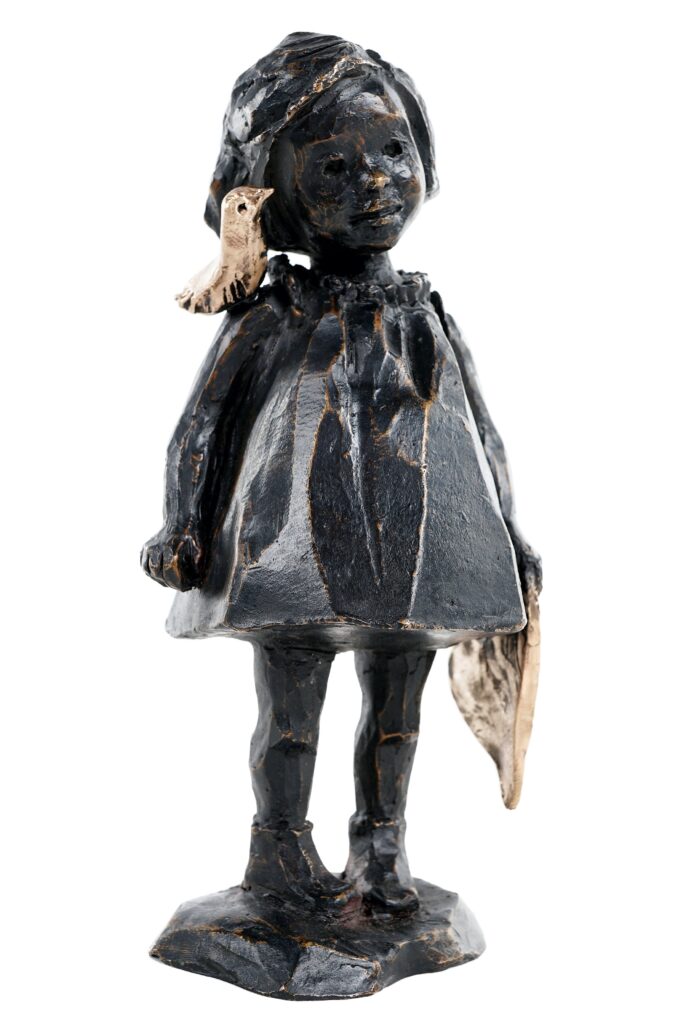

- [Sophie]: We live moments of profound communion with God. On one occasion, this manifested itself in tears of joy and peace that I could not hold back in front of the tabernacle, as if God's love was cascading into my wide-open heart. On another occasion, I was convinced that Jesus was there beside me, saying: "I am going to take care of Cedric. You take care of being happy, by his side, develop your talents, cultivate your friendships, and Cedric will reap your joy". And in my day-to-day life, I receive so many winks from God, and I told myself that one day I would write them down so as not to forget them!
But there are also moments of despair when Heaven seems to be empty, despite my cries for help. In those moments, I tell myself "be confident, be patient, one day you will have the answer". And it works. But sometimes it is hard to wait.
Sophie, the attitude you describe in the book could be described as optimistic, did you consider yourself an optimistic person before the accident? Do you consider yourself one now? Or do you think that the attitude you had comes from a different origin than optimism?
- [Sophie]: Before the accident, I would make a mountain out of a molehill. I tended to dramatize and complicate my life. The tsunami of the accident put things in place. If I wanted to survive, I had to stick to the reality of the moment, quiet my imagination and build on rock.
I believe that trust in God is more than optimism. Optimism is thinking that everything is going to be okay. I didn't think that everything was going to be all right, I thought that God was going to help me get through whatever I was going to have to go through, whatever Cedric's condition was.
You have several children to whom you have not hidden the reality of your story. How do you tell them what is happening? How do you teach them to be patient with your different rhythm of life?
- [Sophie]: The children were born after their father's accident. It is the only way they have known him. So they don't expect more than he can give them. Sometimes they have compared him to other fathers, and that has sometimes been a bit painful, but when we ask them now if they would have preferred to be born in another family, they say no. They love their father as he is and would not change him for anything else. They love their father the way he is and would not change him for the world.
The hardest period was adolescence, especially because of certain cognitive sequelae: his amnesia, his ideological obsessions and his uncontrollable tantrums. There were difficult moments with the children, but we overcame them... or almost! Our youngest son is 13 years old and the others are 16, 18 and 20.
The rhythm of our lives is quite hectic, because I try to make regular trips with 2, 3 or 4 children. I don't always take Cédric with me because he likes the quietness of our cottage, next to his parents, in the middle of nowhere. Cédric has a lot of freedom there because everything is designed for his electric wheelchair. He can walk alone in the woods with the dog, and go back and forth between our house and his parents' house. I no longer have any qualms about leaving him there because he wants to be there.
For example, on the trips the children and I have taken, we have been able to stay in a tree house, go to the sea, see Mont Blanc or go skiing in the Alps (Cédric hates snow!) These are moments that I am particularly fond of and that leave us with very good memories. I do everything I can so that disability does not take up too much space in family life and so that the children have as "normal" a life as possible.
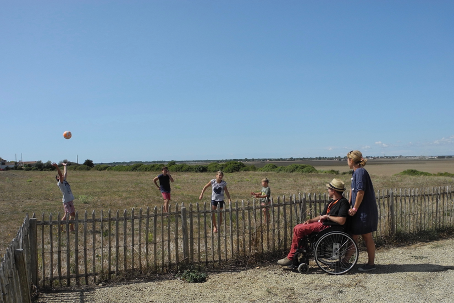

You talk a lot in the book about the importance of talking things through, what does good communication in marriage and family consist of?
- [Sophie]: My credo is that everything can be said, but you have to know to whom, put it in the right way and choose the right moment. By nature, it is very difficult for me to keep quiet about what worries me. Fortunately, Cédric is a great listener and sometimes gives good advice (when his amnesia allows him to consider the whole situation). When Cédric is sad, I encourage him not to hold back tears. We allow ourselves to cry because it makes us feel good and allows us to get to the bottom of things. Expressing his distress relieves him.
It's the same with the children. I try to talk to them about everything. I tell them about my difficulties so that they don't feel reluctant to tell me about theirs. I tell them all the time (and Cédric too) that they are my whole life and that their happiness is important to me, so they should not hesitate to come to me so that I can help them and listen to them. The idea is that we are a united family in the face of adversity. Our family should be a refuge for them while they build their own.





